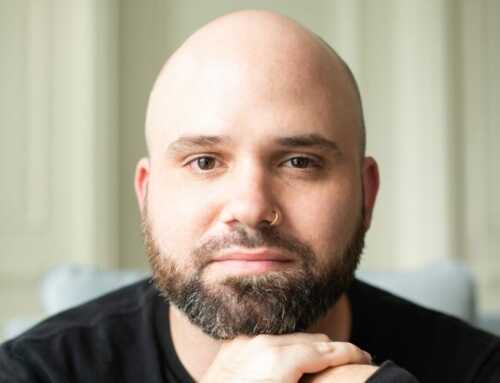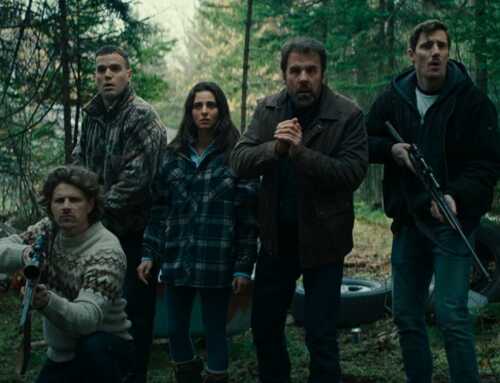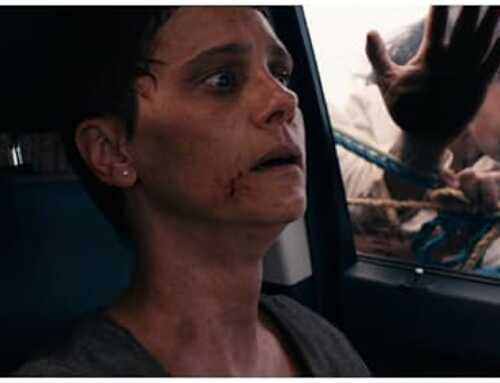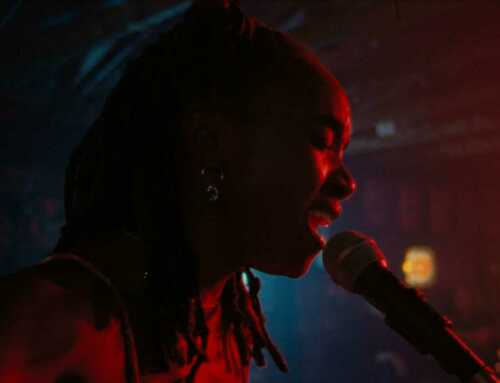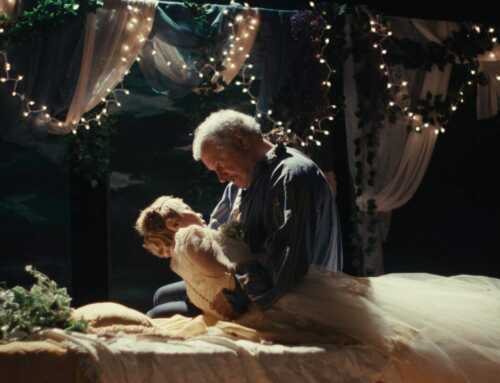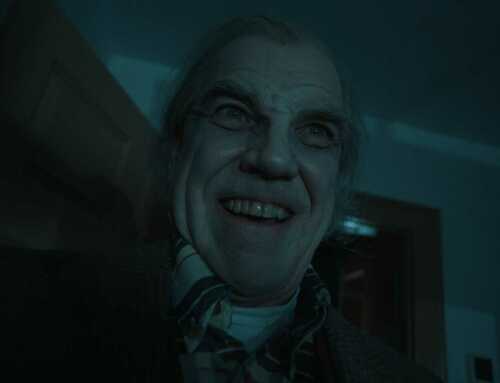Though director Perry Blackshear’s three features, They Look Like People, The Siren, and When I Consume You, differ in terms of the horrors they address, they do have some common threads. Trauma, addiction, and mental health struggles are running themes throughout Blackshear’s work. He often utilizes some of the same cast and crew on his sets, too, while handling everything from directing, to editing, to cinematography. His work embodies independent filmmaking and DIY ethos.
When I Consume You debuted at the Fantasia International Film Festival last year and is still making the festival rounds, playing most recently at the Jim Thorpe Independent Film Festival. It’s there where we talked to the director about his influences, his working relationship with Midnight Mass writer/director Mike Flanagan, and his latest feature. They Look Like People, meanwhile, just got the special Blu-ray treatment by Vinegar Syndrome and Yellow Veil Pictures.
What was the inspiration for When I Consume You?
I was going through a down period, and I remember thinking how physical it feels when you’re depressed. It didn’t feel like it was in my head but in my body. I think that was an inspiration. I wanted to make a movie about going through something psychologically dark that also felt physical. I also think there’s this struggle where life can be tough, and you have to be tough to face it. Sometimes, though, in learning how to fight against the problems of the world, you lose sight of your humanity. It becomes harder to love and harder to connect with other people because you’re too busy fighting. I always wanted to make a film with two characters that embodied that. Daphne’s (Libby Ewing) philosophy is if something hits you, hit it back three times harder and don’t stop until it’s dead. Wilson’s (Evan Dumouchel) philosophy is to just be nice, and maybe it will go away. They both have a place in some ways. I wanted to make a film about that balance.
Who are some of the other directors you turn to for inspiration?
I’ve been making movies since I was in middle school. We made superhero fight scenes in my room. I can’t believe I’m talking about that! I went through many phases in college. I was obsessed with Bergman and Lynch. Before that, I was obsessed with the things teenagers are obsessed with, like Star Wars.
I came to horror kind of late. My first feature wasn’t even supposed to be a horror film. It was supposed to be a drama about two young men struggling with failure in their life, based a bit on a friend of mine who had a mental breakdown, and whether the friendship could save these two young men. But the more I researched schizophrenia, the more frightened I became, and the more frightening the whole project became. Just by attempting to be true to that experience, the movie ended up becoming scary. Through that, I started to really fall in love with movies like Mike Flanagan’s Absentia and the original Let the Right One In, a movie where the horror elements make the coming-of-age narrative have teeth and muscle. The drama element could give the horror film heart and soul.
In graduate school, they looked down at genre. They thought, to do genre, you had to get rid of the heart and school to make it what it was. I decided they could both make each other better. The types of films I love follow a mold where they have a big heart. They have something to say that matters, but the process is scary or a blast in some way. The best horror to me is like an ancient, coming-of-age ritual from cultures long ago where you get put through the wringer mentally, but you survive. You undergo this induction, but in the end, you’re okay. You’ve peered into the darkness, and you’re safe. You can take that back into your life one way or the other.
Can you talk about the working relationship that you have with Mike Flanagan? He’s also given you a lot of praise over the years.
He has a big internet presence, and he really champions films that people consider undiscovered gems. There’s also a lot in common in terms of stuff we love. Midnight Mass may be my favorite TV show. It uses horror to examine the human condition, including life and death. He’s so serious about that aspect. I also sold a show through his company, and we worked together on that. It was in the vein of The Haunting of Hill House. I also have a tremendous amount of respect for the familial aspect he develops on sets. He carries that philosophy forward, a type of loyalty and integrity.
You’ve worked with the same crew and cast quite often. What’s the idea behind keeping your films close-knit with your friends?
Part of it is a practical reality. It’s like being in a band. You don’t wait for the funding. You go make stuff and see if it works or not. Having a set with a high level of trust is so great, not just for the soul, but practically, it makes the work so much better. I think we’ll probably continue to make films together, somehow. I just love being out there, with my hands on the camera. That’s my happy place. I keep doing it with those people. I hope to expand the network, too. Libby was new this time around. She was a producer on When I Consume You, too. She ended up making a web series, and I think she’ll direct a feature soon.
Can you talk about the character arcs of siblings Daphne and Wilson in When I Consume You? Wilson especially undergoes quite a change.
All the men in the movie have shared some version of this experience. I don’t want to assume that it’s universal, but I think we would probably be considered on the sensitive side of manhood. We make art, but there come points in your life, where it gets hard enough, that you have to change. Situations are so bad that you need to toughen up. I think all of us have done that, and we’ve gone too far doing that. In the process of attempting to be an adult in a certain way, we went through phrases of hardening our hearts and getting so intense that we lost sight of ourselves and the people we love. The character of Christian (Dumouchel)) in They Look Like People went through a similar thing, but with this, we wanted to up the balance and explore those two poles. I do think Wilson needed something to shake him out of his zone. I think Daphne realizes what the audience realizes. But then you wonder what she created. We talked about the Hebrew myth of the golem and the idea that she made this Frankenstein’s Monster.
What are some of the challenges of being so hands-on with a film and stepping into so many roles, including directing, writing, cinematography, and even editing?
It’s great, but it’s also really hard. For me, it was a single person on set, rather than the actors. I had to pull my own focus. That was miserable, especially at night. Sound was always a real problem, too. I think it’s also tough to shoot and direct at times. On The Siren, I had different hats that I’d take off and put on. It’s easy when you’re shooting to get lost in the technical stuff. I had to really be careful not to indulge in my cinematography. Shooting and directing are great. You get to control everything, but it’s like a split-brain syndrome. There are other advantages, though. You can go anywhere at any time to shoot, but it’s a real mixed bag.
Your films are different from each other, but you have some common threads regarding addiction, trauma, friendship, and even masculinity. Is that intentional?
You put your dreams up there, along with the dreams of your cast. It becomes a collective dream. Sometimes, people tell me things about the film that are like a dream interpretation. After my cousin saw They Look Like People, he said it’s about masculinity as madness. I was like, jeez! I do think all of them have an element about growing up and struggling with knowing how to be. I think all my films are love stories to some degree. Mike [Flanagan] has a phrase that I repeat ad nauseam now. It’s not a horror movie. It’s a movie about people you care about going through scary things. This film has an antagonist, but the other ones didn’t have an antagonist. It’s about good people fighting against the difficulty of the world.
Can you talk about the influence of Buddhism on When I Consume You?
I don’t like to shout it from the rooftops. It isn’t my culture. I don’t want to make a giant deal of something that’s not from my lineage, background, and heritage. During a dark time in my life, I read a lot of primary texts. There were a lot of other influences, too, including the works of Thomas Merton. There’s also a book called The Heart of Understanding by Thich Nhat Hanh. I read that in college, and it blew my mind. Hopefully, the work I do has a spiritual bent, talking about things that matter a lot and how to be in the world. My hero, J.R.R. Tolkien, was very, very Christian. Even without organized religion, there can be stuff that is sacred and holy. That’s made my life better.
How did you pull off some of the effects in When I Consume You?
I’ve been watching a lot of films from the 1970s. There was something exciting about that. I do think the effect that worked the best is when the bad guy grabs Daphne’s face and puts his hand in her mouth. We wanted something upsetting that wouldn’t be typical. There is something upsetting about that image. We had Libby put her hand through MacLeod Andrews’ coat, so that’s her own hand doing it. She did it to herself, so that way, it was a lot easier. The other effect I was happy with is when the hand pops up on the phone. I just thought that was fun. It uses a little bit of camera trickery. Sometimes, having a smaller budget is difficult, but you find ways to be inventive.
What are you working on next?
There are bigger projects that I can’t really talk about. There are two TV shows making the rounds now, and there’s a larger movie. Maybe because the world is hard enough right now, the movie is a little more playful. In terms of smaller projects, there are two things we’re working on. One is set in Ireland. I can say it’s a ghost story. The other one is about people that stumble upon a cursed play. They’re supernaturally compelled to put it on. They realize it may be opening a portal, and it’s more of a ritual than a play.
Thanks so much for taking the time to chat with us, Perry.


